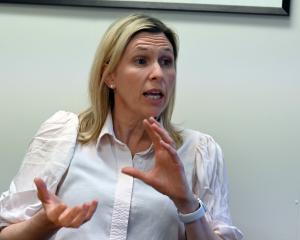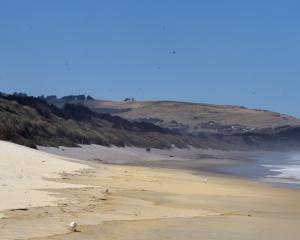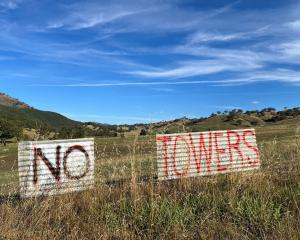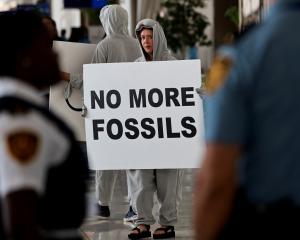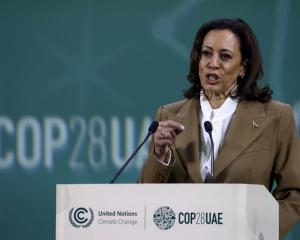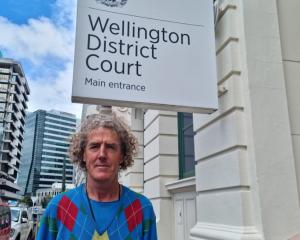Westerm culture finally collapses in 2073 as a result of climate change, according to US historian of science Naomi Oreskes.
Well, that's how she paints it in the apocalyptic sci-fi tale The Collapse of Western Civilization: A View from the Future. It's a detour into grim fiction by a woman whose stock in trade is cold hard facts, in an attempt to find new ways to communicate the urgency of global warming.
In her short story, Prof Oreskes' protagonist, a future historian living in the Second People's Republic of China, is looking back, examining how ''the children of the Enlightenment'' failed to act.
The fictional historian concludes that the West was paralysed by its ideological fixation with free markets and the doubt-mongering of vested interests, and not helped by climate scientists' reluctance to cry calamity until the last piece of evidence was in.
It's a fiction, and yet not entirely. The essay employs the facts available, including a law promoted by North Carolina Republicans last year to prevent scientific measurements being used in planning for sea-level rise. That's true, they did.
And events since the publication of the story, in the journal Daedalus earlier this year, make Prof Oreskes appear as prescient as ever.
Much of the noise around September's Intergovernmental Panel on Climate Change (IPCC) report has followed her script. Dismissive denialism on one side, overcautious science-speak on the other.
As part of her search for a way to break the debate out of that debilitating cycle, she is coming to Dunedin next week, for the science communication forum the ScienceTeller Festival, at which she says she is keen to explore new ways of spreading the science.
The American has helped to frame the debate before.
A 2004 essay ''The Scientific Consensus on Climate Change'', published in Science, was one of the first to identify the overwhelming agreement among scientists about climate change. It was cited in the documentary An Inconvenient Truth, among other places.
And her 2010 book Merchants of Doubt exposed the science-for-hire behind attacks on the IPCC's reports.
The ''merchants of doubt'' have been at it again in response to the IPCC's latest, the Working Group 1 Fifth Assessment Report, out last month, Prof Oreskes says.
She's on the phone from the United States, where she is professor of the history of science at Harvard University.
''One of the patterns we have seen in the past is that often they do a kind of pre-emptive thing before the IPCC or the scientific community releases something significant, so the last year we have seen a big effort on the part of sceptic or contrarian groups to claim that the warming has paused, that the warming has stopped.
"And that's entirely false. It is entirely based on cherry-picking data, which is an old strategy that we are familiar with, but nevertheless, it has had an impact.''
Prof Oreskes is more familiar with the tactic than most, as it forms the recurring motif of her book, written with Nasa historian Erik M. Conway, who also co-wrote The Collapse of Western Civilization.
In the book, the pair detail the way in which a small group of politically motivated scientists, and the institutes they established, disputed the dangers of tobacco, argued against the environmental threat posed by acid rain, denied the peril of ozone depletion and are now needling away at the science of climate change.
Their modus operandi was established working for tobacco companies, for which they sowed doubt about the link between smoking and cancer by playing on weak popular understanding of how science works.
As Oreskes and Conway explain in Merchants of Doubt, most of us don't really understand what it means to say something is a cause.
"We think if A causes B, then if you do A, you will get B. But in the case of smoking, you don't necessarily get cancer. The ''merchants of doubt'' used this lack of understanding to argue no causal link had been proven.
Prof Oreskes sees the same obfuscation and selective use of information being employed in the climate-change debate, most recently in deniers' focus on the relative ''pause'' in atmospheric temperature warming in the past 15 years.
Despite the familiar pattern, the scientific community has been sucked in again, trying to argue the point, which ''in my opinion is bad politics and it is bad science. There is no pause,'' Prof Oreskes says with an exasperated laugh.
''And if you look at the long-term trends, it is perfectly clear warming is continuing, period, end of story.''
The IPCC Work Group 1 report confirms the professor's view, explaining that the deniers' favoured 15-year period falls within a 30-year span - the gold standard for measuring climate - that was likely the hottest for more than 1000 years.
The conclusion to Merchants of Doubt is that those arguing against the regulation of smoking, against regulations to clean up the pollution that leads to acid rain and ozone depletion, and against regulation of CO2 emissions are not really talking about science at all.
They are talking about politics. Many of the scientists who took up the tobacco, acid rain and ozone debates were old Cold War warriors, who saw regulation as contrary to American ideals of liberty. For them environmentalists were watermelons: ''Green on the outside, red on the inside''.
Prof Oreskes' analysis has not gone down well with the denialist fraternity.
In a post on the notoriously anti-climate science website JunkScience Prof Oreskes is referred to as the ''environmentalist Noam Chomsky'' - comparing her to the bête noire of conservative American politics.
''She thinks that anyone who questions environmentalist doctrine is evil,'' the writer continues, ''... if you question the dubious studies concerning second-hand tobacco smoke, you must be in the pay of tobacco companies''.
But Prof Oreskes is not alone in making a connection between climate-change denial and right-wing politics.
In a study published this year, psychologist Prof Stephen Lewandowsky, of the University of Bristol, found a link between people who endorse free markets and those who reject climate science, as well as other established scientific findings, such as that smoking causes lung cancer.
They are also more likely to believe conspiracy theories.
Is it time then to ignore ideologically driven intransigence, in order that some progress can be made on reducing greenhouse gases?
The Los Angeles Times and Popular Science, think so, the former this month deciding it would no longer publish letters from climate-change deniers, the latter closing the comments section on its website.
Prof Oreskes, though, is not yet ready to ignore the doubters, as she says their ideas continue to percolate through to the general public.
''What you can do is respond to it on your own terms, right? The scientific community keeps getting pulled into this denialist framework and saying: 'Oh, we will have to explain the pause now'.
"No, you don't have to explain the pause, there is no pause. What you have to do is explain what you know.
"And that's a tricky thing, because if the scientific community gets too technical then they lose the audience. But if they just respond to the question or the claim as it is framed, then they have bought into the doubt-mongering.''
This is what makes the doubt merchants' strategy so effective, she says.
''Because it is natural for scientists to want to answer a question, right?''That's why this strategy is almost diabolical, right? Because it takes the strength of science, scientific curiosity, scientific scepticism and the impulse of scientists to want to answer a question and turns that against scientists.''
But some of the uncertainty about climate change cannot be laid at the feet of deniers, Prof Oreskes says. The scientific community must own some responsibility too.
Its insistence on quantifying everything down to the last few percentage points does not help, she says.
For example, the Fifth Assessment Report was released with an imprimatur of 95% confidence that climate change is occurring and is caused by human activity.
Prof Oreskes says that sort of quantifying is a very ''scientistic'' way of speaking that would be better ditched in favour of plain English.
''So when you talk about the 95% certainty ... it makes it seem as if: 'Oh, well then there is still 5% uncertainty','' she says laughing at the idea.
''In the normal ordinary sense of the word in which we could say we know something, scientists know that the world is warming. And I think when you speak to the public it makes sense to speak in normal language.
''The other thing about this uncertainty thing, I think that's another interesting place where we see the effect of the sceptical contrarian denialist claims, because uncertainty has been the single biggest trope.
"It is the mantra of climate-change denial: 'We really don't know, the scientists remain uncertain', well, the fact is the science isn't actually very uncertain.
"There are elements of the science that are uncertain, but the big picture is actually really really very well-established and has been for a long time. And I don't think the scientific community does enough to emphasise that.
"This whole language of uncertainty, it seems to me, is very defensive, it is saying: 'OK, we have been accused of not being certain, so let's quantify the uncertainty, because after all, that's what we do.
"We are scientists, we quantify. If we quantify it then that will solve the problem'. Of course, it does not solve the problem for two reasons. One, is because the ordinary person does not understand what scientists mean when they say they have 95% confidence.
"Number two, there are some intellectual and scientific questions about what it really even means to put a statistical number on what is essentially a subjective expert judgement. So there are issues there.''
Then she thinks of a third thing.
''Then the third thing, I think the most important thing is, you know, it's just weird, right?
"So I wrote this little satire and sent it to my sons last week, 'The IPCC's view of love and marriage'. 'I love you: virtually certain'. 'I want to marry you: very certain'.
"'We will be happy together . . .','' Oreskes says, squawking in amusement at the sort of language the IPCC employs.
''In normal language we don't talk like that, right? Nobody would ever accept a marriage proposal, if I said 'I want to marry you, fairly certain'.''
Prof Oreskes will give two talks at the ScienceTeller Festival, the first on ''Telling the truth through fiction''.
It might be, she says, that there needs to be a rethink about who should be doing the work of telling the story of climate change.
''Maybe it is a case that the scientific community can't, it is not their challenge, it is not their toolkit.
"But other people, film-makers, storytellers, journalists, people who tell stories for a living, both true and fictional, you'd have to say there is more of a role for those people to play.''
Experiments like hers, in fiction, might reach a new audience, helping ''people to understand why this is an issue now and not just for the future, what's at stake, all those kinds of things, the kinds of things that scientists are not so good at talking about''.
The second talk is on ''The fallacy of rationality''.
''We are all supposed to stay calm and remain rational but it is actually irrational not to be upset about what's going on right now,'' Prof Oreskes says.
Indeed, rationality alone ''is not doing a job''.
The work of neuroscience professor Antonio Demasio, of the University of Southern California, may provide a clue, she says.
''He tells us that even on the basic level of neurological function that we are actually not able to separate reason and emotion.
"When we do hard maths problems for example, the emotional centres of our brains light up.
"So that tells us that when people tell us we have to separate reason from emotion, they are actually being unscientific.
''I want to say let's look at what we do know.
"Both from our own experience, from literature, from art and also from neuroscience about this question, and maybe we can start thinking in a more integrated way, and we can realise that the emotional component is part of the story and we should be upset about what's going on.
"If we are not upset then we are really not assimilating the issue. [Australian professor of public ethics] Clive Hamilton once said: 'If you are not depressed, you are in denial'.
"I think that might be a little harsh, because I know a lot of people who I don't think are in denial about this issue and they still go about their daily lives.
"And I wouldn't want to advocate that we all get depressed, because that is not helpful, but if we are not at least a little upset, then it seems to me that we aren't really assimilating the reality of the situation.''
Prof Oreskes needs to get away now, it is morning where she is and she's expected at work. As a result she's talking 10 to the dozen, but sounding no less lucid for all that.
There's one last question, though. And it's about politics in her backyard. It is a commonly accepted tenet that US leadership is the sine qua non of international affairs. Certainly many Americans think so.
But the various arms of US government appear intent on wrestling each other into a sleeper hold.
So, what prospect progress stateside?
''Well, clearly on the federal level you would have to be smoking something to expect anything to advance from the federal level, considering our government is half shut down at the moment,'' Prof Oreskes concedes.
''But remember, politics functions at a lot of different levels. It functions at a state level, it functions at a local level, it functions in communities.''
Her own home-town community, she says, is making good progress towards converting to solar power.
''So that's politics on a local level but if that were recapitulated across the United States that would make a difference and it would also demonstrate that this is possible to do despite federal gridlock.
''I think if you look at history you will always see, people in power don't like to give up power. People for whom the system works well don't see any reason why it should change.
So often change doesn't come from the top, it comes from the bottom up or the middle outward or the near-top down. There are a lot of different ways in which social and political change can happen.
So that's grounds for optimism. I am by no means hopeless about this issue but I am worried because I do think we are getting short on time considering what we need to do and what the impacts of climate change are already starting to be.''




